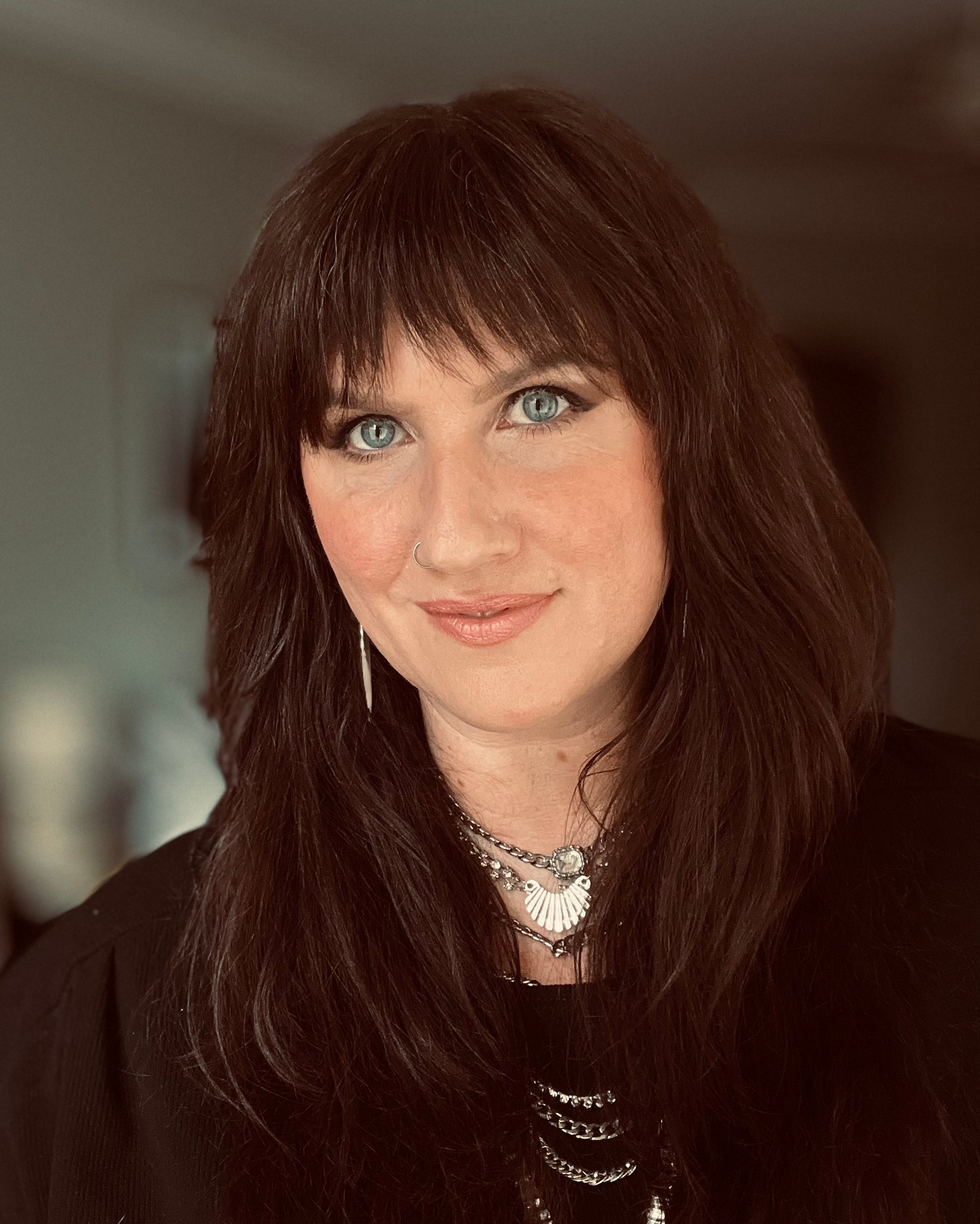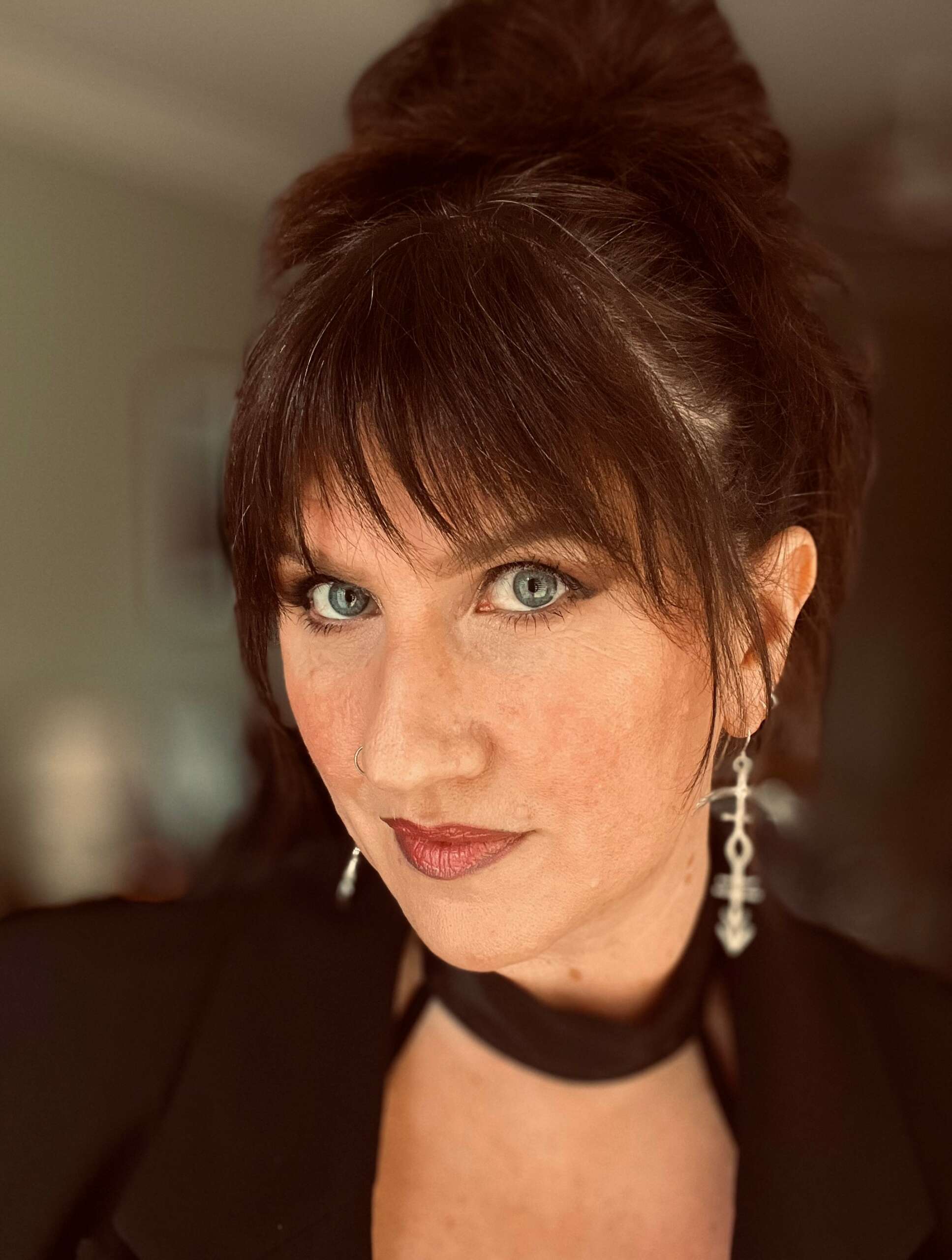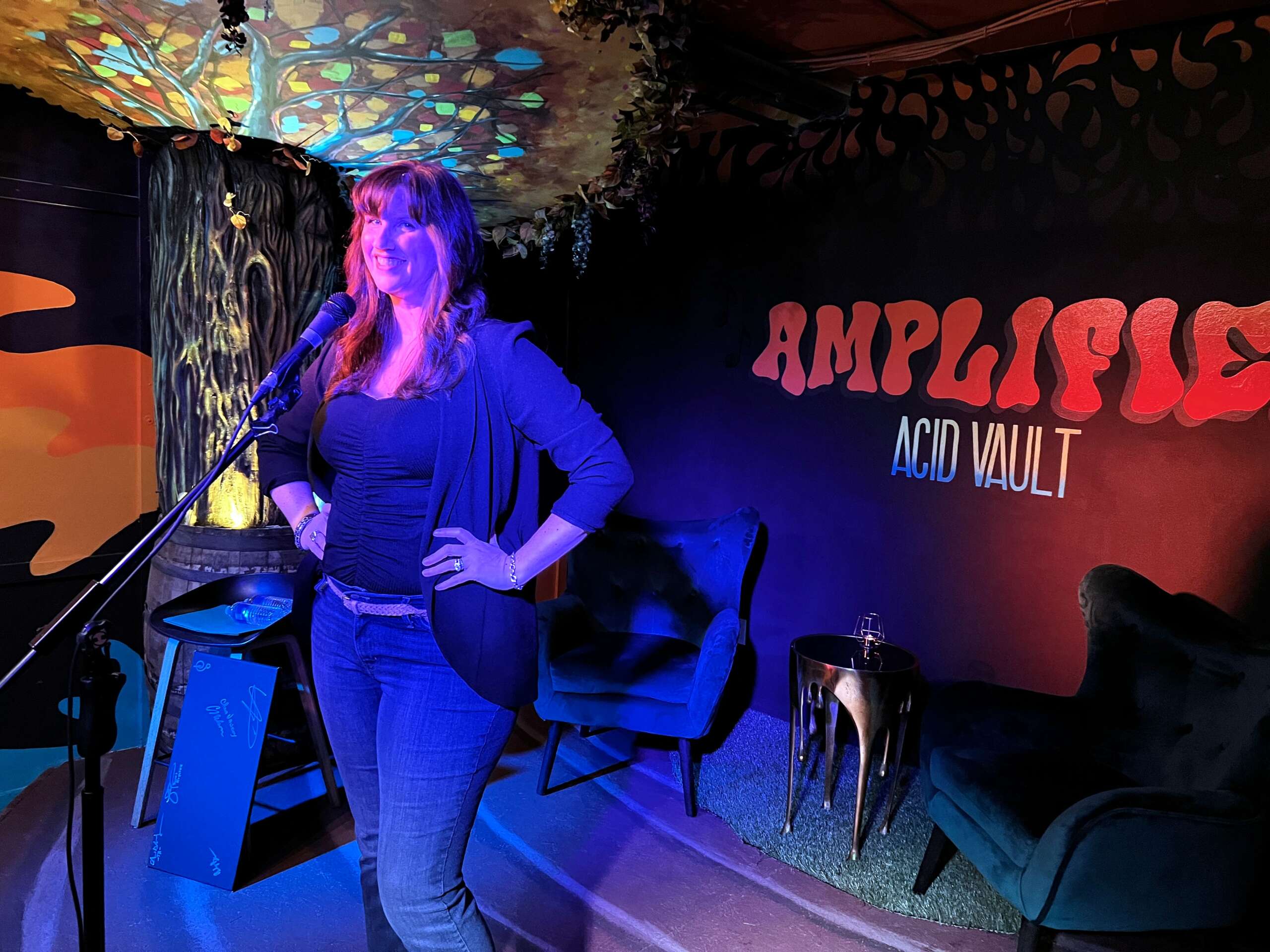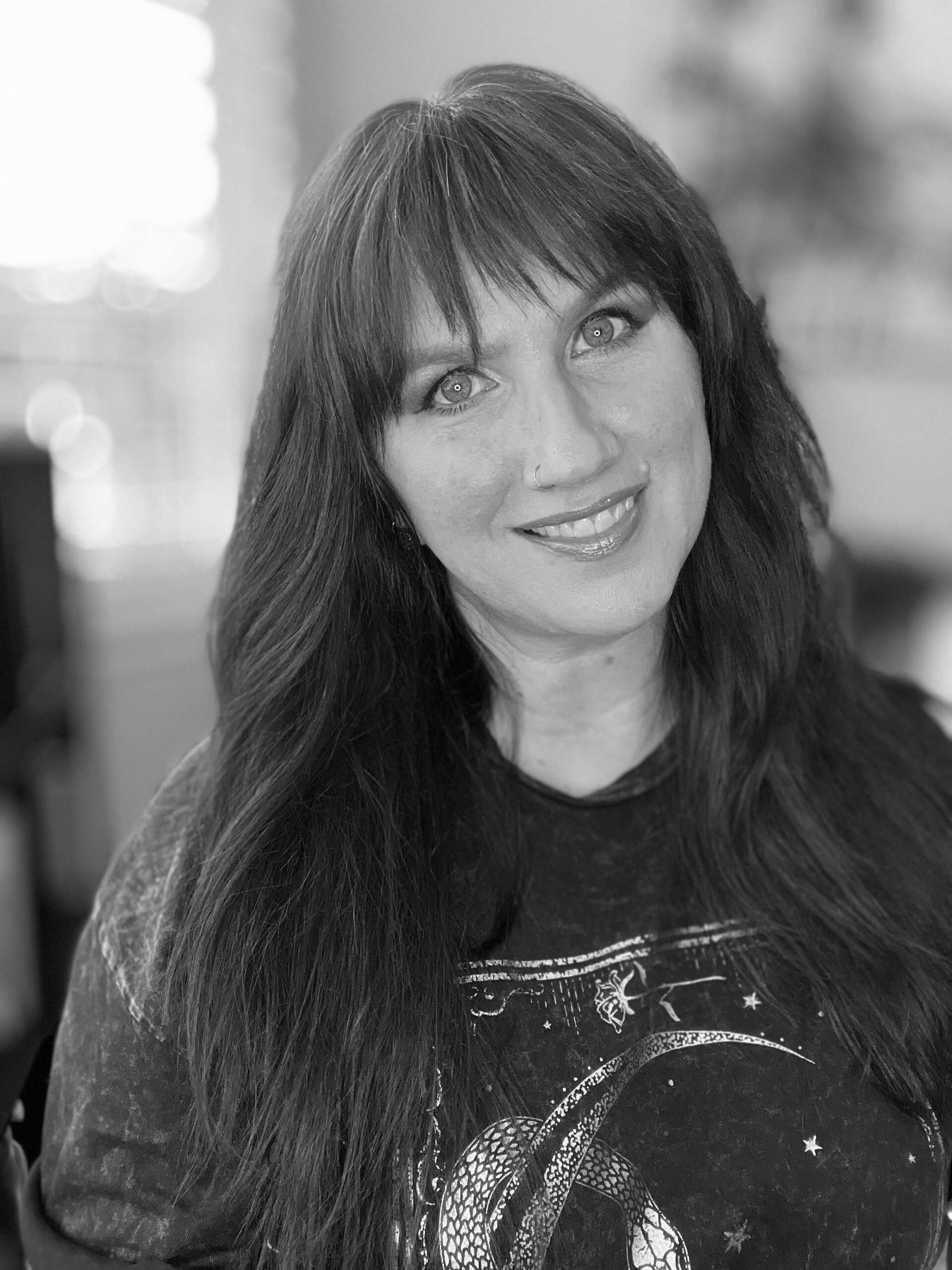We were lucky to catch up with Leslie Ferguson recently and have shared our conversation below.
Alright, Leslie thanks for taking the time to share your stories and insights with us today. We’d love to hear about a project that you’ve worked on that’s meant a lot to you.
The most personally meaningful project I’ve worked on is my memoir When I Was Her Daughter. This book was a lifetime in the making simply because I had to live the trauma before I ever knew I would write about it. Organizing the memories, learning the craft, and spending years editing and revising are all part of the writing process, but the time we spend suffering and coping, the time we spend becoming—that’s all crucial to memoir. Writing a memoir brings many challenges writing fiction does not. This project allowed me to finally process my traumatic childhood so I could begin to heal from it. It was a huge undertaking and also a necessary one for my growth and my ability to make sense of everything that happened. I am proud of myself for finishing it and publishing it.
When I was young, I never thought about my future unless I had to for a school assignment. I lived day to day, often wondering if I would survive to see tomorrow, wondering if I would go hungry or cold again, wondering if my mom, brother, and I would be safe from my mom’s destructive and often violent mental illness. To look back at where I started and to consider how far I’ve come, I realize this book is my legacy, my little mark on the world that proves I survived. The fact that this book exists is proof that I will continue to survive. It’s my reminder that I am resilient and can withstand any storm. And that makes me feel safe and empowered.
And now, my book has its own life, and I hope it finds whoever needs it.


Leslie, love having you share your insights with us. Before we ask you more questions, maybe you can take a moment to introduce yourself to our readers who might have missed our earlier conversations?
After college, I earned my teaching credential and then taught high school English for almost two decades. A few years after I started teaching, I went to Chapman University for my MA in English literature and MFA in creative writing. I’d always loved writing, but in graduate school, I focused more and more on learning about poetry, fiction, and creative nonfiction, and I grew into the idea of becoming a writer. I never thought I would stop teaching, but when I married my husband, I relocated and reevaluated some of my goals. With my husband’s encouragement and support, I took a sabbatical, and when we moved from Los Angeles to San Diego in 2014, I sought out the creative writing scene. Opportunities arose that pulled me more toward writing and working in the publishing industry, and I walked through the doors that seemed right for me.
One thing I love is helping other writers discover their potential. I always enjoyed this aspect of teaching high school and college students. Now, I get to do it as a developmental editor, guiding writers to hone their craft and voice. What sets me apart is the way I coach my clients. I err on the side of honesty while empowering them to choose what feels right for them. I sometimes craft examples for them to consider and use in their stories. I find this to be a meaningful way to teach the art of writing—and it’s a technique I used often when I taught writing to my students. When you show people an example of how something can be done, and you work with them—questioning and exploring ideas—to come up with answers, they learn to see new possibilities. This usually guides them to exactly where they need to be—and that’s often a place they never knew existed. Sometimes, a writer can better understand what does work for them when they are presented with an example that doesn’t work for them. The one-on-one coaching that I provide is meant to teach practical aspects of writing in genre and to guide the writer to their own solutions so they can continue to grow as artists and strengthen their unique talents.
I also am very aware of how, for me, editing and creating go hand in hand. I am a better writer because of how I approach editing, and I am a better editor because of how I approach writing. I find it rewarding to push clients to discover and develop the interesting layers of their work. Connecting characters and events to themes is a favorite of mine. We all know a story isn’t about what we see on the outside—it’s not about what the characters are doing on a literal level. A story is about what’s happening below the surface. And it’s my goal to help writers explore that so they can create works that speak to the mind, heart, and soul of the reader. Everything in writing, for me, comes down to the characters as representations of real people and to their stories as representations of real life. This means a work must have a heart beating inside it. Otherwise, the story and characters cannot come to life on the page.


What do you find most rewarding about being a creative?
The most rewarding aspect of being a creative—other than connecting with readers and having someone tell me they love my work and that it’s had a profound impact on them—is connecting with other creatives. There is something so liberating and exciting about being a part of a creative community and embarking on various adventures of creativity. I wish by this I meant literally frolicking among the tulips—and it can mean that. But I’m referring to the writers’ groups and collectives and the programs and camaraderies I’ve discovered of which I am honored to be a part. My life is so much richer because of the friendships I’ve formed within the writing community in San Diego.
Being an author is a lonely pursuit. We’ve heard this over the centuries from writers who, while called to write, have also felt adrift in the depths of their minds and the accompanying compelling need to always be creating. So much potential depression awaits the burdened creative. That sounds so dreadfully romanticized and cliché, doesn’t it? But I think it’s true.
Connecting with others who share a similar compulsion helps me feel less alone. I think this is true for most of us; our relationships with the people in our lives are a source of light and joy. But to be a writer is to be a repeat reject—those rejection letters love to fly in as if on wings of targeted soul annihilation. Yet we writers keep submitting our work in hopes of acceptance. It’s an allegory, really. Don’t we all want to connect and find acceptance in some form or another? We pretend like we don’t care what other people think, yet at the same time, we continue striving to be seen and understood—hoping our words will find a good home and make a difference somewhere, somehow. So, in this endeavor, it’s uplifting to cultivate community and to force myself to get outside of my cluttered mind sometimes by laughing and sharing with like-minded creatives who get what I’m going through.


How about pivoting – can you share the story of a time you’ve had to pivot?
When I was eleven, I went to live with my sixth-grade teacher and her husband. I’d been in an abusive foster home, and when my teacher discovered this, she wanted to help me. There’s a long story there, but in terms of a time when I had to pivot in life, this shift marked the beginning of my security and stability, the beginning of Leslie Ferguson. That sounds wonderful, I know. But the pivot came with so many strange feelings about my life and who I was. Had I betrayed my biological family by feeling happy to live with my teacher? And because I started calling my teacher and her husband “Mom” and “Dad”? Who was I now that I was using my teacher’s last name and pretending nothing bad had ever happened to me? Who was I if I was pretending my “Mom” and “Dad” had always been my mom and dad and we’d always been a stable, safe, “perfect” family?
Denying my past so that I could cope was the only way I could move forward. But the weirdest thing about that was I didn’t do it consciously. I simply unbecame myself, crawled into the life of another girl, and lived a lie. But that lie was also now the truth. The pivot was shifting into a new place and identity—yet again—to play the role of the good girl, the perfect girl, so everyone would love me. And this brings us full circle back to the beginning of my trauma where I tried so hard to be loved because it felt like some semblance of control. So, if I could make my teacher and her husband and my friends and all my other teachers love me, and if I could get proof that my biological family loved me, then maybe I wouldn’t feel sad or worthless anymore. I think it’s so tragic, really.
Writing these things makes me want to reach out and hug that lost, lonely little girl. Sometimes—no—a lot of the time, she still shows up, and I have to remind her she is lovable just the way she is even when she’s wrong or angry.
Writing my memoir was another pivot toward disillusionment and restoration. It brought me back to myself; it was the best thing I could’ve done to begin to heal. I recommend it. Then again, anyone trying to heal through memoir must be ready and willing to travel a long dark path to get to the light. For me, it wasn’t a choice. I got to the point where I couldn’t have ignored the story and its truths if I’d tried. Writing it was a way to get the painful past out of my mind and body and put it on paper where it could no longer consume me emotionally or physically. And to explain that statement in a way that would do it justice, I’d have to write a whole book about it.


Contact Info:
- Website: LeslieFergusonAuthor.com: https://lesliefergusonauthor.com/
- Instagram: @MoreLeslieF: https://www.instagram.com/moreleslief/?next=%2F
- Facebook: Leslie Ferguson Profile: https://www.facebook.com/leslie.ferguson.42/ ; Leslie Ferguson Author Page: https://www.facebook.com/Lesliefergusonauthor/
- Linkedin: Leslie Ferguson: https://www.linkedin.com/in/leslie-ferguson-mfa-221a1890/
- Substack: https://lesliefergusonauthor.substack.com/p/hello-dear-writers
-
My book’s Amazon purchase page: https://a.co/d/6Uymcn3


